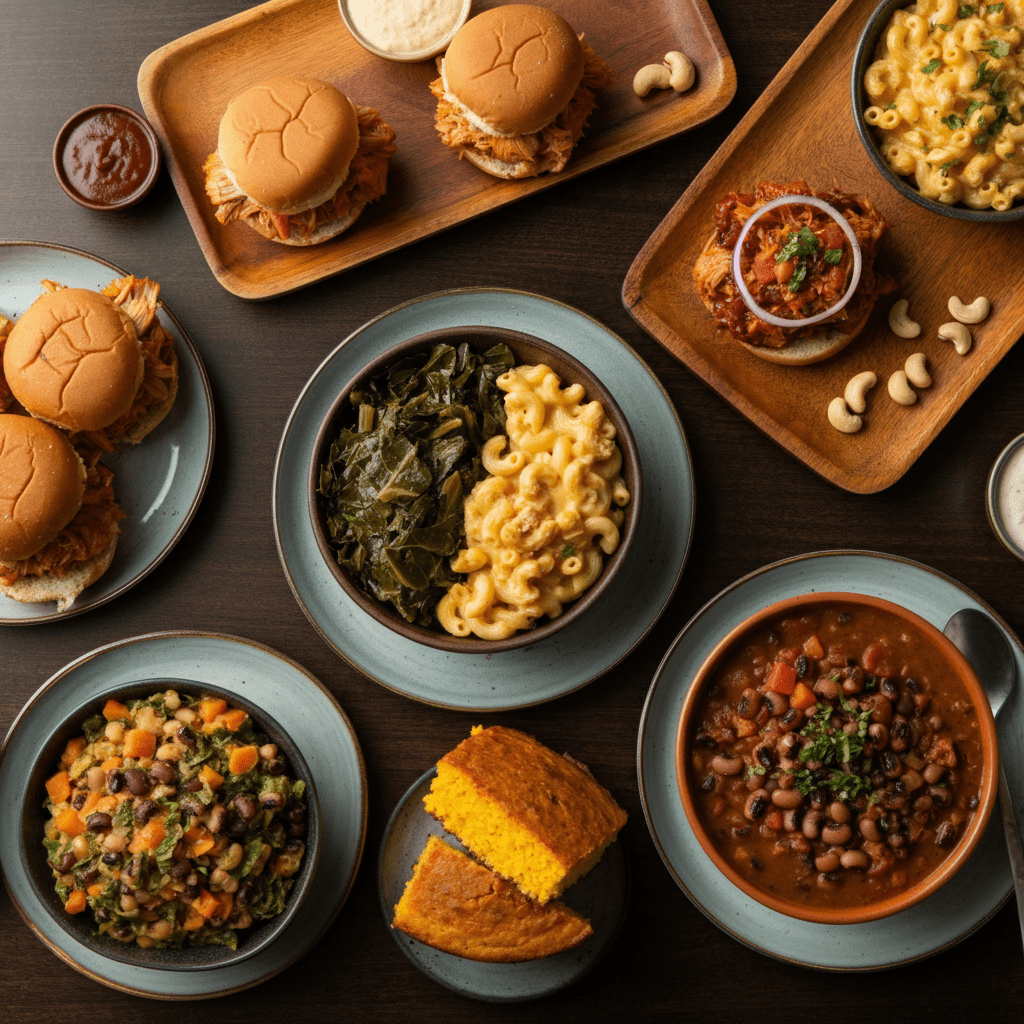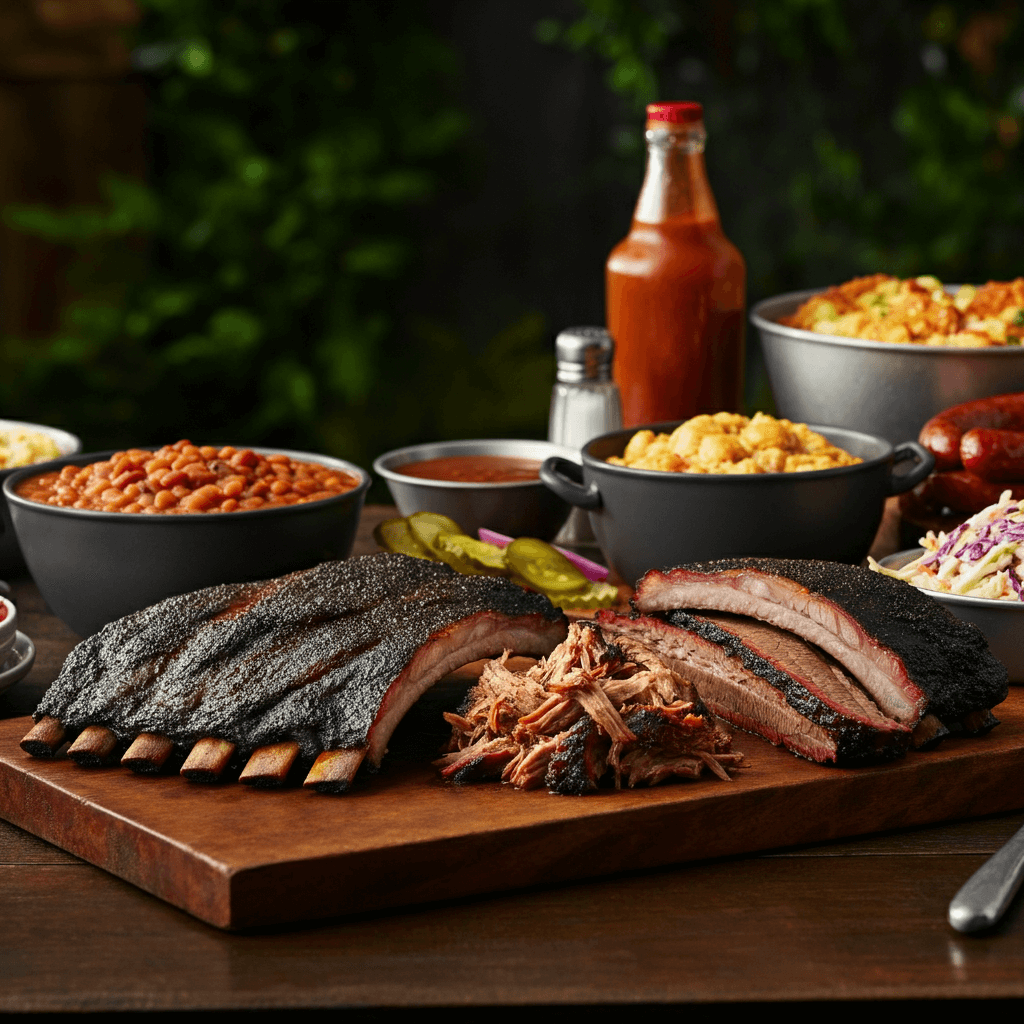What Is Soul Food? The Definitive Guide
Soul food is a rich, traditional African American cuisine developed in the Southern United States, characterized by flavorful, hearty dishes made from locally available ingredients. Born from necessity during the era of slavery, soul food represents cultural resilience, culinary innovation, and the profound ability to transform humble ingredients into nourishing, memorable meals that truly feed both body and spirit.
This iconic American soul food tradition combines West African cooking techniques with indigenous American ingredients, creating a distinct culinary legacy that has become central to America’s food identity. From crispy fried chicken to tender collard greens, this beloved cuisine tells a powerful story of resourcefulness, community, and unmatched flavor that continues to evolve and influence modern American dining.
“Soul food isn’t just cooking—it’s cultural memory preserved through flavor. Each dish carries stories of survival, celebration, and the profound creativity of African American communities.” — Dr. Jessica B. Harris, Food Historian
Table of Contents
What Are the Origins of Soul Food?
The roots of traditional soul food trace back to the American South during the era of slavery, when enslaved Africans were forced to create nourishing meals from limited, often discarded ingredients. This cuisine emerged from profound hardship but evolved into a celebrated culinary tradition showcasing the ingenuity and creativity of Black cooks across generations.

The Historical Timeline of Soul Food Development:
- West African Roots (Pre-1619): Traditional cooking methods and flavor profiles from West African cuisine laid the foundation.
- Colonial Period (1619-1775): Enslaved Africans adapted their cooking techniques to new ingredients available in America.
- Antebellum South (1776-1860): Distinctive cooking traditions developed on plantations, with African Americans preparing food for both enslaved communities and white households.
- Post-Emancipation (1865-1900): Freed African Americans continued cooking traditions while incorporating new ingredients as they became available.
- Great Migration (1916-1970): As millions of African Americans moved north, soul food spread throughout the country, becoming a nationwide cuisine.
- Civil Rights Era (1950s-1960s): The term “soul food” was popularized, celebrating black cultural identity and heritage.
- Contemporary Era (1970s-Present): Soul food has gained recognition as an essential American cuisine while continuing to evolve with healthier variations and chef-driven innovations.
“The story of soul food is the story of America itself—complex, painful, joyful, and ultimately transformative. These dishes represent the triumph of creativity over circumstance.” — Marcus Samuelsson, Chef and Author
Which Ingredients Define Soul Food Cooking?
The heart of American soulfood lies in its distinctive ingredients, many of which reflect historical necessity and cultural preservation. Understanding these foundational elements helps appreciate the depth and significance of this beloved comfort soul food tradition.
The Essential Soul Food Ingredient Guide:
- The Holy Trinity: The aromatic foundation of countless soul food dishes:
- Onions: Providing sweetness and depth
- Bell peppers: Adding brightness and color
- Celery: Contributing texture and subtle flavor
- Primary Proteins:
- Chicken: Especially whole chicken, fried or stewed
- Pork: Particularly less expensive cuts like neck bones, ham hocks, pig’s feet
- Fish: Especially catfish, whiting, and buffalo fish
- Game: Including rabbit, squirrel, and venison in rural traditions
- Vegetables and Legumes:
- Greens: Collards, mustard, turnip, and kale
- Okra: Used in gumbos, stews, and fried
- Black-eyed peas: Eaten for prosperity, especially on New Year’s Day
- Sweet potatoes: The foundation of candied yams and sweet potato pie
- Grains and Starches:
- Cornmeal: Used for cornbread, hush puppies, and coating
- Rice: Often served with beans or as a base for other dishes
- Grits: A breakfast staple with various preparations
- Fats and Seasonings:
- Pork fat/lard: Traditional cooking fat for many dishes
- Hot sauce: Especially pepper vinegar for greens
- Herbs and spices: Particularly sage, bay leaf, thyme, and cayenne
For a deeper exploration of how these ingredients come together in modern contexts, see our guide to healthy, easy soul food recipes with a vegetarian twist.

What Are the Most Popular Soul Food Dishes?
Soul food cuisine encompasses a diverse array of dishes that reflect regional variations, family traditions, and seasonal availability. Here’s a comprehensive guide to the most iconic soul food offerings that define this beloved American food culture.
The Essential Soul Food Dish Collection:
Main Courses
- Fried Chicken: Perhaps the most iconic soul food dish, featuring a perfectly seasoned crust and juicy meat. Learn our extraordinary fried chicken recipes.
- Smothered Pork Chops: Pan-fried and then slow-cooked in gravy until tender.
- Oxtails: Slowly braised until fall-off-the-bone tender. Discover how to make soul food oxtails like grandma.
- Country-Fried Steak: Tenderized beef, breaded, fried, and covered in gravy.
- Catfish: Often cornmeal-crusted and fried to crispy perfection.
- Chitlins (Chitterlings): Cleaned and slow-cooked pig intestines, a dish representing resourcefulness.
- BBQ Ribs: Slow-cooked with smoky, sweet sauce. Explore our ultimate guide to deep south BBQ and soul food.
Side Dishes
- Mac and Cheese: Baked with a golden, crispy top and creamy interior.
- Collard Greens: Slow-cooked with smoked meat for flavor.
- Black-Eyed Peas: Often seasoned with pork and served especially on New Year’s Day. Learn about unlocking the magic of Southern black-eyed peas.
- Cornbread: From sweet to savory variations depending on the region.
- Candied Yams: Sweet potatoes cooked with butter, sugar, and spices.
- Mashed Potatoes: Often enriched with plenty of butter and sometimes cheese. Try our creamy garlic parmesan mashed potatoes.
- Okra: Prepared fried, stewed, or in gumbo.
- Red Beans and Rice: A Monday tradition in many households.
- Biscuits: Flaky, buttery, and essential for sopping up gravy.
- Coleslaw: Creamy or vinegar-based as a cooling counterpoint.
Desserts
- Sweet Potato Pie: A holiday essential. Learn to make the ultimate sweet potato pie.
- Peach Cobbler: Featuring fresh or preserved peaches under a sweet biscuit topping.
- Banana Pudding: Layers of custard, cookies, and bananas. Discover the ultimate guide to perfect banana pudding.
- Red Velvet Cake: A vibrant, rich dessert. Try our foolproof red velvet cake recipe.
- 7-Up Cake: A sweet pound cake made with the lemon-lime soda.
- Bread Pudding: Repurposing stale bread into a sweet, custardy treat.
For more inspiration, explore our collection of 10 must-try southern side dishes that perfectly complement these main courses.

How Does Soul Food Vary by Region?
The soul food scene across America shows fascinating regional variations, each reflecting local ingredients, cultural influences, and historical developments. Understanding these regional distinctions helps appreciate the diversity within this unified culinary tradition.
Regional Soul Food Map:
Deep South (Georgia, Alabama, Mississippi)
- Distinctive Elements: Heaviest African influences, emphasis on preserving techniques
- Signature Dishes: Cracklin’ cornbread, smoked neck bones, peach desserts
- Key Ingredients: Abundant use of pork, peaches, pecans
Lowcountry (Coastal South Carolina, Georgia)
- Distinctive Elements: Strong seafood influence, rice-based dishes
- Signature Dishes: Frogmore stew, shrimp and grits, red rice
- Key Ingredients: Fresh seafood, rice, okra
Louisiana and Gulf Coast
- Distinctive Elements: Creole and Cajun influences blend with traditional soul food
- Signature Dishes: Gumbo, jambalaya, étouffée
- Key Ingredients: Holy trinity (bell peppers, onions, celery), seafood, filé powder
Appalachian Soul Food
- Distinctive Elements: Mountain influences, preservation techniques, wild ingredients
- Signature Dishes: Apple stack cake, soup beans, chow-chow relish
- Key Ingredients: Sorghum, dried beans, foraged items
Northern Urban Soul Food (Chicago, New York, Detroit)
- Distinctive Elements: Adapted for urban environments during the Great Migration
- Signature Dishes: Chicken and waffles, fish fries, turkey and dressing
- Key Ingredients: Adaptations to available ingredients in northern markets
To experience how these regional variations appear in Louisiana-influenced soul food, see our guide to easy Louisiana-style soul food dishes.
How Has Soul Food Evolved?
Modern soul food continues to evolve while honoring its roots, with contemporary chefs and home cooks reinterpreting traditional dishes for today’s tastes and nutritional awareness. This evolution demonstrates the living nature of this cuisine.
Contemporary Soul Food Trends:
Plant-Based Innovations
The growing interest in plant-based diets has sparked creative vegan and vegetarian soul food variations that maintain traditional flavors while eliminating animal products. Explore our guide to soulful vegan cooking.
Health-Conscious Adaptations
Modern soul food often features:
- Baking or air-frying instead of deep-frying
- Using olive oil or avocado oil instead of lard
- Incorporating more fresh vegetables and whole grains
- Reducing sodium and sugar while maintaining flavor
Chef-Driven Innovation
Notable chefs revolutionizing soul food include:
- Mashama Bailey (The Grey, Savannah)
- Edouardo Jordan (JuneBaby, Seattle)
- Carla Hall (television personality and cookbook author)
- Todd Richards (Lake & Oak BBQ, Atlanta)
Fusion Approaches
Contemporary soul food embraces global influences while maintaining its essential character:
- Soul-Asian fusion (collard greens egg rolls, miso-glazed oxtails)
- Soul-Mexican combinations (black-eyed pea empanadas, cornbread tamales)
- Soul-Mediterranean blends (okra and tomato tagines, harissa-spiced fried chicken)
For more on innovative approaches, see our article on soul food with a modern twist.
Is Soul Food Healthy? Nutritional Considerations
The nutritional profile of traditional soul food has been both criticized and misunderstood. While classic preparations often feature fried foods and rich ingredients, the cuisine also has inherently healthy elements and can be adapted for contemporary nutritional goals.
Soul Food Nutrition Comparison Table:
| Dish | Traditional Preparation | Calories | Healthier Alternative | Calories | Key Benefits |
|---|---|---|---|---|---|
| Fried Chicken | Deep-fried in vegetable oil with flour coating | 320 per piece | Oven-baked with crispy herb coating | 180 per piece | 44% fewer calories, 60% less fat |
| Collard Greens | Cooked with ham hocks and salt | 225 per cup | Prepared with smoked turkey and reduced sodium | 150 per cup | 33% fewer calories, 70% less sodium |
| Mac and Cheese | Full-fat cheese, whole milk, butter | 410 per cup | Reduced-fat cheese, almond milk, less butter | 280 per cup | 32% fewer calories, higher fiber |
| Candied Yams | Heavy brown sugar and butter syrup | 285 per serving | Light maple syrup, spices, less butter | 160 per serving | 44% fewer calories, 66% less sugar |
| Cornbread | Made with bacon drippings | 235 per piece | Made with olive oil and whole grain cornmeal | 175 per piece | 25% fewer calories, 3x more fiber |
Soul Food’s Healthy Foundations:
Despite misconceptions, soul food’s roots include many nutritious elements:
- Leafy greens rich in vitamins A, C, and K
- Beans and legumes high in protein and fiber
- Sweet potatoes packed with beta-carotene
- Fish providing omega-3 fatty acids
For fitness-focused soul food adaptations, see our guide to transform classic fried chicken into a muscle-building marvel.
What Is the Cultural Significance of Soul Food?
Beyond nutrition, soul food traditions represent a profound cultural legacy that has shaped American identity and provided strength and continuity for African American communities. Understanding this deeper meaning helps appreciate why these foods matter beyond their flavors.
Soul Food as Cultural Expression:
Community Building
Soul food has historically brought families and communities together, particularly through:
- Sunday dinners after church
- Holidays and celebrations
- Family reunions
- Community gatherings and church events
Historical Resilience
These cooking traditions represent:
- Survival and creativity during slavery and oppression
- Knowledge preservation across generations
- Cultural resistance and persistence
- Transformation of hardship into celebration
Identity and Pride
Soul food expresses:
- Connection to African heritage
- Regional and family identities
- Cultural distinction and recognition
- Culinary expertise and artistry
Spiritual Nourishment
The phrase “food for the soul” has literal meaning in this tradition:
- Connection between physical and spiritual nourishment
- Cooking as an act of love and care
- Food as a vehicle for memory and storytelling
- Meals as settings for prayer and thanksgiving
For more on the importance of family traditions in soul food, see our article on soul food family: celebrating traditions around the table.
How Do I Cook Authentic Soul Food?
Creating authentic soul food American dishes requires understanding both ingredients and techniques that have been refined over generations. These foundational approaches help develop the distinctive flavors that define soul cooking.
Essential Soul Food Cooking Techniques:
Seasoning Secrets
- Layer flavors throughout cooking: Add seasonings at multiple stages rather than all at once
- Season by taste, not just measurement: Develop an intuitive understanding of flavor balance
- Use meat as seasoning: Small amounts of smoked meat flavor large pots of vegetables
- Perfect the pepper vinegar: Essential for finishing greens and other vegetables
Critical Cooking Methods
- Slow cooking: Patience yields tenderness in tough cuts of meat and develops deep flavors
- Proper frying technique: Maintaining consistent oil temperature (around 350°F) for crisp exteriors and juicy interiors
- Roux-making: The foundation for gravies and sauces, requiring constant attention
- Seasoning cast iron: Building up cookware that imparts flavor to future dishes
Essential Equipment
- Cast iron skillets: For cornbread, frying, and even desserts
- Large stockpots: For greens, beans, and soups
- Dutch ovens: For braises and stews
- Wooden spoons: For stirring without scraping precious seasoning from pans
For beginners looking to start their soul food journey, explore our foolproof, easy soul food recipes for beginners.
Which Soul Food Dishes Should I Try First?
For those new to soul food America, starting with these accessible dishes provides an excellent introduction to the cuisine’s flavors and techniques before moving to more complex preparations.
Soul Food Starter Guide:
- Fried Chicken: The gold standard of soul food dishes, with crispy exterior and juicy meat
- Mac and Cheese: Baked to perfection with a golden crust
- Cornbread: A quick bread essential for sopping up sauces and gravies
- Collard Greens: Slow-cooked with smoky flavors
- Candied Yams: Sweet potatoes transformed into a sweet-savory side
- Black-Eyed Peas: Simple but flavorful legumes with deep meaning
- Banana Pudding: A crowd-pleasing dessert that’s easier than it looks
- Peach Cobbler: A fruit-forward dessert that showcases Southern ingenuity
For more approachable recipes to begin your soul food journey, see our collection of quick, easy soul food dishes for busy weeknights.
Soul Food vs. Comfort Food: What’s the Difference?
While often used interchangeably, soul food vs comfort food represents an important distinction. Understanding the relationship between these concepts helps appreciate soul food’s specific cultural context while recognizing its influence on broader American cooking.
Key Distinctions:
Historical Context
- Soul Food: Specifically evolved from African American culinary traditions developed during slavery and afterwards
- Comfort Food: A broader category encompassing nostalgic or emotionally satisfying dishes from any culture
Cultural Specificity
- Soul Food: Directly tied to African American history, experience, and cultural expression
- Comfort Food: Varies widely across regions, ethnicities, and backgrounds
Ingredient Focus
- Soul Food: Often features specific ingredients like collard greens, black-eyed peas, and particular cuts of meat
- Comfort Food: May include any ingredients that evoke nostalgia or satisfaction
Cooking Techniques
- Soul Food: Employs specific methods like slow-cooking greens with smoked meats or particular frying techniques
- Comfort Food: Uses whatever methods create the desired nostalgic result
While all soul food can be considered comfort food, not all comfort food is soul food. The distinction lies in the specific cultural heritage, historical context, and culinary traditions that define authentic soul cuisine.
Preserving Soul Food Heritage
As soul food cuisine continues to evolve, balancing innovation with tradition ensures this vital culinary heritage remains vibrant for future generations. Here are key approaches to preserving this important American food tradition.
Approaches to Preservation:
Documentation and Storytelling
- Recording family recipes and techniques
- Collecting oral histories from community elders
- Creating cookbooks that include context and stories
- Developing museum exhibits and cultural programs
Education and Mentorship
- Teaching cooking skills to younger generations
- Supporting culinary programs focused on African American foodways
- Creating community cooking classes
- Mentoring emerging chefs interested in soul food traditions
Supporting Soul Food Businesses
- Patronizing traditional soul food restaurants
- Engaging with soul food caterers for events
- Following modern soul food chefs on social media
- Attending food festivals celebrating soul food traditions
Adapting While Honoring Traditions
- Creating healthier versions while maintaining authentic flavors
- Documenting innovations alongside their traditional inspirations
- Understanding which elements are essential to preserve
- Recognizing soul food as a living, evolving tradition
For those interested in exploring the deep historical roots of soul food, see our article on sweet traditions: exploring the history of soul food desserts.
Classic Soul Food Recipe: Southern Collard Greens
This foundational recipe demonstrates the essential techniques that define soul food cooking, creating layers of flavor from simple ingredients.
Ingredients:
- 2 bunches fresh collard greens (about 2 lbs)
- 1 smoked turkey wing or ham hock
- 1 large onion, chopped
- 3 garlic cloves, minced
- 2 tablespoons apple cider vinegar
- 1 tablespoon brown sugar
- 1 teaspoon red pepper flakes
- 1 teaspoon salt (adjust to taste)
- ½ teaspoon black pepper
- 4 cups chicken broth or water
Instructions:
- Thoroughly wash collard greens, removing stems and chopping leaves into 2-inch pieces.
- In a large pot, sauté onion until translucent, about 5 minutes.
- Add garlic and cook until fragrant, about 1 minute.
- Add smoked turkey wing or ham hock, broth, vinegar, sugar, and seasonings.
- Bring to a boil, then reduce to a simmer and cook for 30 minutes.
- Add collard greens, stirring to submerge in liquid.
- Cover and simmer for 60-90 minutes until greens are tender but not mushy.
- Remove meat, chop any edible portions, and return to the pot.
- Taste and adjust seasonings before serving with pepper vinegar on the side.
For more soul food recipes passed down through generations, visit our collection of soul food classics: recipes passed down through generations.
Conclusion: The Enduring Legacy of Soul Food
Soul food stands as one of America’s most distinctive and important culinary traditions, representing much more than just delicious cooking. It embodies history, resilience, creativity, and community—a testament to the human capacity to create beauty and nourishment even in challenging circumstances.
Whether you’re enjoying traditional preparations that honor historical methods or exploring contemporary adaptations that reflect modern nutritional knowledge, engaging with soul food means connecting with a profound cultural heritage that has shaped American identity. By understanding both the historical context and evolving nature of these dishes, we can fully appreciate their significance beyond mere sustenance.
For a deeper exploration of soul food’s rich heritage, visit our comprehensive journey through history, flavor, and tradition.
Last Updated: May 18, 2025






